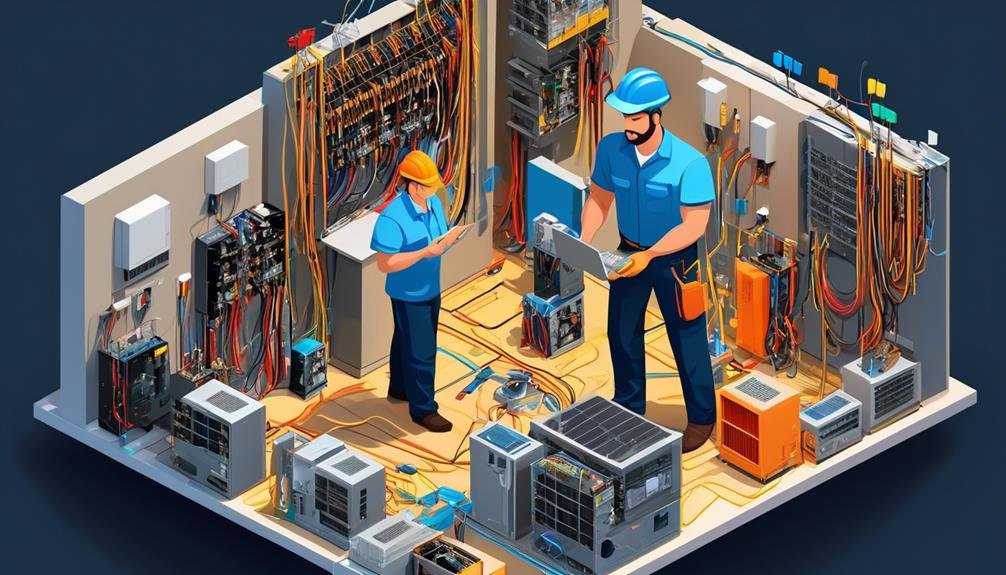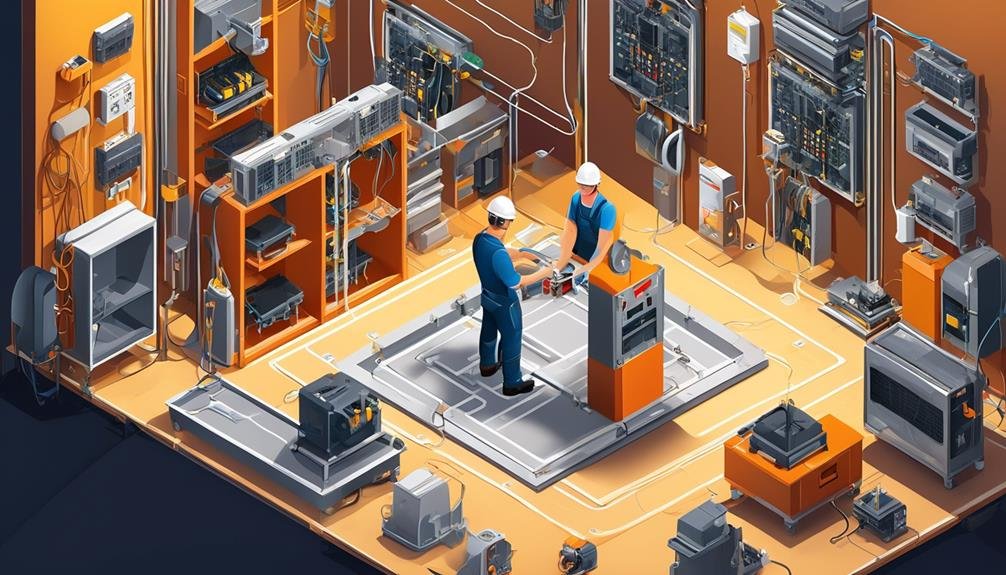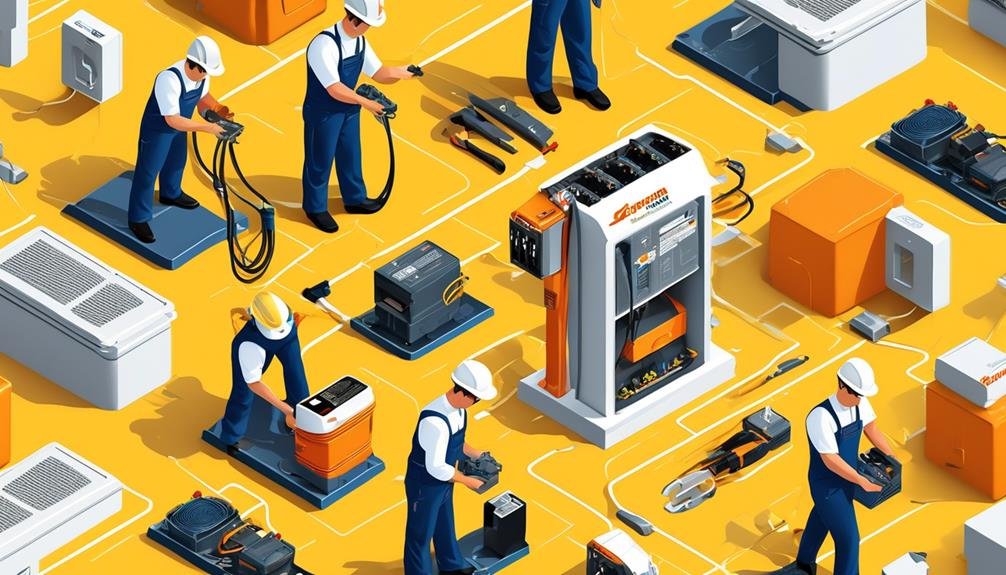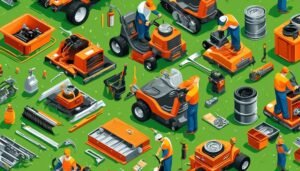Are you tired of constantly fumbling with adapters and extension cords to power your specialized equipment?
Well, it's time to consider a game-changing solution. Hiring an electrician to install specialty outlets for your equipment could be the answer you've been searching for.
But before you dismiss this idea as unnecessary, let's explore the reasons why it might just be the smartest decision you'll make for your setup.
Key Takeaways
- Hiring a licensed electrician knowledgeable about electrical codes is important for safe and compliant installation of specialty outlets.
- Specialty outlets provide protection against voltage spikes and power surges, preventing costly damage to equipment and reducing maintenance and replacement costs.
- Specialty outlets are durable, made with high-quality materials, and designed to withstand heavy usage, ensuring long-lasting performance and avoiding frequent replacements.
- Hiring an electrician for the installation of specialty outlets comes with a professional warranty, providing added assurance and covering repairs or replacements, saving from unexpected expenses.
Safety Considerations
To ensure the safety of both the equipment and the users, it's crucial to consider various factors when installing speciality outlets. When choosing the location for the outlets, make sure to select an area that's easily accessible and free from potential hazards. It's important to avoid installing outlets near water sources or in damp areas to prevent electrical shocks. Additionally, ensure that the outlets aren't placed in areas where they may be exposed to extreme temperatures or direct sunlight, as this can cause damage to both the outlet and the connected equipment.
Another important consideration is the capacity of the outlets. It's essential to select outlets that are capable of handling the electrical load required by the equipment. Overloading the outlets can lead to overheating, which can cause damage to the equipment and even start a fire. Therefore, it's recommended to consult an electrician to determine the appropriate outlet capacity for your specific equipment.
Furthermore, it's vital to use high-quality outlets that meet safety standards. Look for outlets that are UL-listed, as this ensures that they've undergone rigorous testing and meet the necessary safety requirements. Using substandard outlets can increase the risk of electrical malfunctions and accidents.
Electrical Code Compliance
Electrical code compliance is a crucial aspect to consider when installing specialty outlets for your equipment. The purpose of electrical codes is to ensure the safe and proper installation of electrical systems, preventing hazards such as electrical shocks, fires, and equipment damage. By adhering to these codes, you can ensure that your electrical system meets the necessary standards for safety and functionality.
One important code requirement is the use of the appropriate wiring and circuit breakers for your equipment. Different types of equipment may have specific electrical needs, such as voltage and current requirements. It's essential to select the correct wiring size and circuit breaker capacity to handle the electrical load safely.
Another code requirement is the proper grounding of the specialty outlets and equipment. Grounding provides a safe path for electrical currents in the event of a fault, protecting both the equipment and individuals from electrical shock. It's crucial to follow the code guidelines for grounding to ensure the safety of your equipment and personnel.
Additionally, electrical codes specify the proper installation techniques for specialty outlets, including the use of approved materials and methods. These codes ensure that the outlets are securely installed, reducing the risk of electrical hazards.
To ensure electrical code compliance, it's recommended to hire a licensed electrician who's knowledgeable about the relevant codes and regulations. They can ensure that your specialty outlets are installed correctly and in compliance with electrical codes, providing you with peace of mind and a safe working environment.
Specialized Knowledge and Expertise

Having specialized knowledge and expertise is crucial when it comes to installing specialty outlets for equipment. These outlets are designed to meet the unique power requirements of specific types of equipment, such as high-powered machinery or sensitive electronic devices. Installing these outlets requires a deep understanding of electrical systems and the specific needs of the equipment being used.
Specialized knowledge is particularly important because the installation of specialty outlets involves more than simply connecting wires. Factors such as voltage requirements, grounding methods, and load calculations must be carefully considered to ensure the safe and efficient operation of the equipment. Without this expertise, there's a risk of improper installation, which can lead to electrical malfunctions, equipment damage, or even electrical hazards.
An electrician with specialized knowledge and expertise in installing specialty outlets can provide valuable guidance and ensure that the installation is done correctly. They've the necessary training and experience to assess the electrical needs of your equipment and recommend the appropriate outlet types and configurations. Additionally, they can ensure that the installation complies with all relevant electrical codes and regulations.
Efficient Installation Process
One key aspect of the efficient installation process for specialty outlets is ensuring that the electrical system is properly evaluated and prepared. Before installing speciality outlets for your equipment, it's crucial to assess the capacity of your electrical system to handle the additional load. An electrician will evaluate the current wiring, circuit breaker sizes, and overall electrical setup to determine if any upgrades or modifications are necessary. This step is essential to prevent overloading and potential hazards.
Once the evaluation is complete, the electrician will proceed with the necessary preparations. This involves selecting the appropriate type and size of specialty outlets based on the equipment's power requirements. They'll also ensure that the wiring is compatible and properly connected to the outlets.
During the installation process, the electrician will follow industry standards and regulations to guarantee a safe and efficient setup. They'll carefully install the outlets, making sure that all connections are secure and free from any potential hazards. Additionally, they'll conduct thorough testing to ensure that the outlets are functioning properly and delivering the necessary power.
Avoiding Potential Damage to Equipment

To ensure the safe operation of your equipment, it's important to take measures that prevent any potential damage during the installation process. When installing speciality outlets for your equipment, it's crucial to consider the specific requirements of each device.
One key measure to avoid damage is to ensure that the outlet you choose matches the voltage and current rating of your equipment. Mismatched voltage or current could lead to overheating, short circuits, or even permanent damage to your valuable machinery.
Another precaution to take is to use high-quality wiring and connectors that are suitable for the power demands of your equipment. Flimsy or substandard wiring can cause voltage drops, power surges, or even electrical fires.
Additionally, it's essential to properly ground your outlets to prevent electrical shocks and protect your equipment from voltage spikes.
Furthermore, it's recommended to hire a qualified electrician who's experience in installing speciality outlets. They possess the necessary knowledge and expertise to handle the intricacies of electrical installations, ensuring that your equipment is connected safely and efficiently.
Cost-Effectiveness in the Long Run
Considering the long-term cost-effectiveness is an essential aspect when installing speciality outlets for your equipment. While the upfront cost of hiring an electrician might seem high, it can actually save you money in the long run. Here are some reasons why:
- Efficiency: Speciality outlets are designed to meet the specific power requirements of your equipment. By using outlets that match your equipment's needs, you can optimize energy usage and reduce wastage, resulting in lower electricity bills.
- Protection: Speciality outlets come with built-in surge protection features, which safeguard your equipment against voltage spikes and power surges. This protection can prevent costly damage to your equipment and save you from expensive repair or replacement costs.
- Durability: Speciality outlets are made with high-quality materials that are designed to withstand heavy usage and provide long-lasting performance. By investing in durable outlets, you can avoid frequent replacements, reducing maintenance and replacement costs.
Peace of Mind and Professional Warranty

For peace of mind and added assurance, professional warranty coverage is a crucial aspect to consider when installing specialty outlets for your equipment. While hiring an electrician to install these outlets ensures that the job is done correctly and safely, a professional warranty takes it a step further by providing protection against any potential issues that may arise in the future.
With a professional warranty, you can rest easy knowing that if any problems occur with your specialty outlets, you have the backing of the electrician who installed them. This means that any repairs or replacements needed will be covered, saving you from unexpected expenses. Additionally, a professional warranty often comes with a guarantee of quality workmanship, ensuring that the outlets will function properly and provide reliable power to your equipment.
When it comes to specialty outlets, it's important to remember that they're designed to meet specific requirements and provide optimal performance for your equipment. By hiring an electrician who offers a professional warranty, you can have confidence that the outlets will be installed correctly and in accordance with industry standards.
Frequently Asked Questions
Can I Install Speciality Outlets for My Equipment Without Hiring an Electrician?
You should consider hiring an electrician to install specialty outlets for your equipment. They have the expertise to ensure proper installation, which is essential for safety and preventing any damage to your equipment.
How Long Does It Typically Take to Install Speciality Outlets?
It typically takes a professional electrician a few hours to install specialty outlets. Hiring an electrician ensures the job is done safely and correctly, reducing the risk of electrical issues or damage to your equipment.
What Are Some Common Mistakes to Avoid When Installing Speciality Outlets?
Common mistakes to avoid when installing specialty outlets include using incorrect wiring, improper grounding, inadequate insulation, and insufficient amperage. It's crucial to hire an electrician to ensure a safe and efficient installation.
Are There Any Specific Brands or Types of Outlets That Are Recommended for Certain Equipment?
Yes, it is recommended to hire an electrician for installing specialty outlets for your equipment. They have the expertise to ensure proper installation, which is crucial for safety and optimal performance.
Can I Hire a General Handyman or Do I Specifically Need to Hire an Electrician for This Job?
You should definitely hire an electrician for this job. They have the expertise and knowledge to ensure that the installation is done safely and correctly, which is crucial when dealing with specialized outlets for your equipment.
Conclusion
In conclusion, hiring an electrician to install specialty outlets for your equipment is essential to ensure safety, comply with electrical codes, and benefit from their specialized knowledge and expertise.
This efficient installation process prevents potential damage to your equipment and offers long-term cost-effectiveness. Additionally, the peace of mind and professional warranty provided by an electrician guarantees a reliable and high-quality outcome.
Don't hesitate to make this investment for the smooth operation of your equipment.





